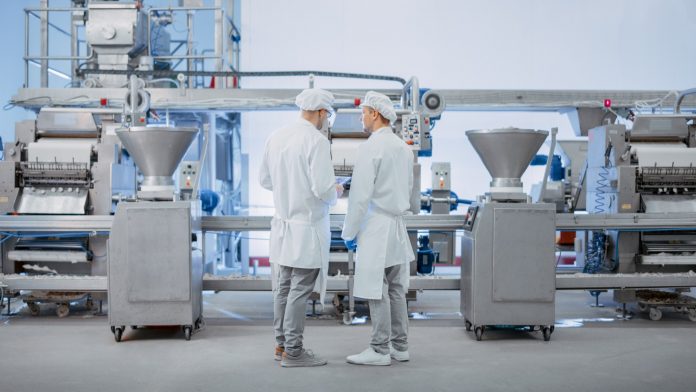To understand the challenges, you need to be on the factory floor

By SMC Corporation Australia & New Zealand Sales and Marketing Director Craig Sheppard.
In Australia, the food and beverage sector accounts for 32% of the country’s total manufacturing turnover and is reported to be worth around $122 billion (Octet 2020). New Zealand, on the other hand, is a major food and beverage exporter, with the industry accounting for 46% of all goods and services exports (Mbie.govt.nz (2021)).
On the global front, the food processing market is expected to grow by 6.04% (CAGR) between 2020 and 2027. This puts pressure on manufactures to fast-track productivity and improve their efficiencies year-on-year.
A recent report compiled by SMC Corporation Europe Industry Manager Food Diego Mirabelli showcased the latest food industry trends and highlighted the challenges in light of the Covid-19 pandemic. It details SMC’s presence on the factory floor to identify the industry’s most pressing automation requirements.
What’s trending in food automation?
Surprisingly, the impact of the Covid-19 pandemic saw a positive uptick in automation.
Companies are changing the way they work. They’re focused on rapidly and continuously addressing challenges around productivity, downtime, energy savings, safety, hygiene and staying competitive in a tough climate.
Food security remains an ongoing issue around the world, and that automation will play a key role in addressing scarcity in the years to come.
Other issues addressed by manufacturers is that of a reliable workforce, and workforce accessibility. Whilst labour is expensive, Covid-19 enforced lockdowns taught some harsh lessons with respect to staff accessing workplaces and the need for social distancing created its own set of challenges – especially in plants where productivity (both day and night) is crucial.
And while workers will always be needed, many companies are now reassessing the workforce to ensure that they are adding value and making a difference to the company’s bottom line.
When analysing the shift (and embrace) of automation, the report by Mr Mirabelli detailed the following as key drivers:
1. Avoiding downtime
Most food plants operate 24/7, so a halt in food production can be costly and time consuming. Most areas are arranged in a continuous flow with one area being dependent on the activity of another – from primary material integration, to processing, and finally, packaging. The OEE (Overall Equipment Effectiveness) can be substantially improved by applying digital predictive maintenance solutions, training operators, and maximising product reliability.
When analysing automation on the plant, Mr Mirabelli believes that the most critical component is the actuator. The procedure to replace an actuator is fast (usually 10 minutes) when its within reach and is easily accessible. In other cases, it can take up to four hours. Of course, the cost of proactively replacing an actuator will usually be a lot less than the cost of a stop in production.
However, to ensure real-time monitoring and pre-empt any issues before they occur, monitoring sensors need to be included as part of the automation control loop. SMC offers two types of sensors. An induction sensor can calculate the speed of the rod while a pressure sensor can identify any leakages inside the actuators. Here, communication takes place via an IO-link in real-time.
2. Productivity linked to automation
While this traditional, fast-paced industry has been lagging in automation penetration, robotics, and its stemmed technology (cobots) are key drivers for enhanced productivity and automation on the factory floor.
Some of our team members are dedicated to understanding and developing solutions to complement robotic technologies. We offer gripping technologies and a wide range of plug and play gripper end-effectors for the majority of cobot suppliers.
Answering to the call by industry, SMC offers wireless technology for robotics applications allowing for gripper communications via wi-fi, allowing for a reduction in weight and faster installation via reduced cabling requirements.
The next step is to introduce smart technologies combining flexible and quick format changes with high cycle rates and low life cycle costs.
3. Reducing costs by optimising energy efficiency
Food factories are energy demanding; they represent 19% of the whole manufacturing industry’s energy consumption. SMC’s energy saving task force can analyse your plant and help you realise savings and efficiency gains.
Improvement costs may vary but the return on investment is often short. Whilst air leaks are still a common theme, there are other air usage areas of focus that can be can critically assessed, for which SMC provides a wide array of solutions: condition monitoring tools which provide information such as flow rate and pressure, Automatic Leak Detection System (ALDS) which provides near real time leakage monitoring and a VEX Stand-by Valve, which reduces air consumption during short stops or shuts it off during long ones.
4. Machine safety and hygiene
Safety and automation work hand-in-hand, and safety valves form a fundamental part of our product range.
Although hygiene has always been a central theme, Covid-19 has driven the message home. Both machine builders and food plants need solutions that are easy to clean and reduce opportunities for contamination.
About SMC
Founded 60 years ago, SMC operates in 83 countries, employing 19,000 people across the globe. It has an R&D engineering team of 1450 and an 8200-strong sales force, who are experts in their field and enjoy a close working relationship with SMC’s customers.
To deliver automation solutions for its diverse customer base, SMC offers more than 12,000 basic products with over 700,000 variations.
SMC is the world’s leading pneumatics provider and has been voted for three consecutive years as one of the most innovative global companies by leading business magazine Forbes and is listed in the FORBES Global 2000 as one of the world’s largest public companies.
For more information, visit smcanz.com. For sales enquiries, contact AUsales@smcanz.com or NZsales@smcanz.com.




